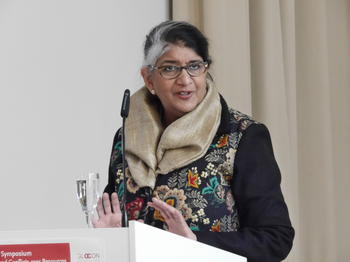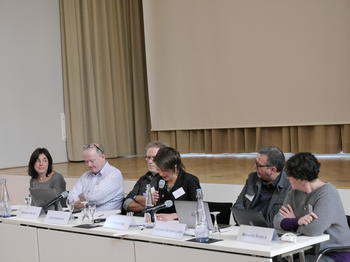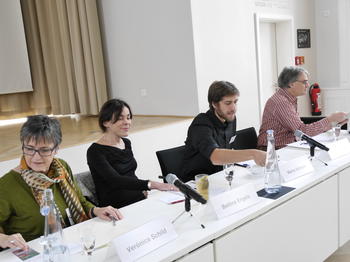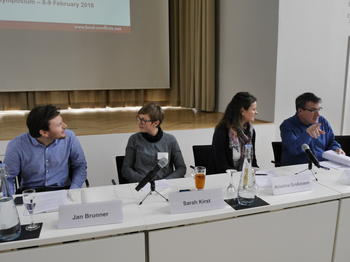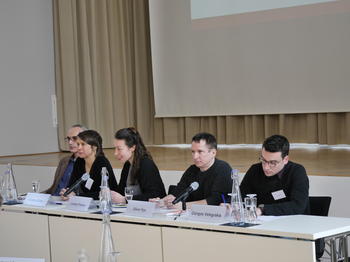GLOCON’s International Symposium “Global Crises and Conflicts over Resources” was highly successful
KEYNOTE: Shalini Randeria / Source: GLOCON
Panel I: Linking conflicts and global crisis: theories and concepts / Source: GLOCON
Panel II: The role of the state in conflicts over resources / Source: GLOCON
Panel III: Resources, conflicts, and social relations / Source: GLOCON
Panel IV: Transformation from below / Source: GLOCON
Over 100 participants followed GLOCON’s second international symposium with the title “Global Crises and Conflicts over Resources” on 8th and 9th February 2018. In 15 contributions on four thematic panels, the keynote speech by Shalini Randeria and the concluding remarks by Ulrich Brand, the relation between global crises and worldwide resource conflicts were debated.
News from Feb 28, 2018
In her keynote, Shalini Randeria (podcast) emphasised that extensive land privatisation in India is not only undertaken for mining or agriculture, but also for the expansion of industry and the modernisation of cities. In India, mainly national companies invest in land. Only rarely do they pursue productive purposes, that is, few new jobs or income possibilities are generated for the rural population. Instead, the former land users are confronted with evictions and the impoverishment. Randeria mentioned the pro-business policies of the Indian state as a decisive factor for wide-ranging privatisation of land in India. According to her, the state profits from the revenues of land sales as well as the issuing of mining licenses and pursues a growth-oriented development policy favouring mainly the private sector. Furthermore, Randeria highlighted the ambivalent role of the law in conflicts over resources. Referring to the current discussions in India on the concept of accumulation by dispossession, she underlined that transformations of urban and rural spaces in the context of global crises are always subject to political enforcement and are not primarily or solely the consequence of market processes.
During the symposium, the relation of global crises and conflicts over resources was debated in four thematic panels. In the panel “Linking conflicts and global crises: theories and concepts”, the focus lay on the epistemological value of various theoretical approaches for the analysis of conflicts over resources. It was addressed what Critical Agrarian Studies, postcolonial studies, a relational perspective as well as the concepts scale and frontier contribute to the analysis of the connections between global crises and conflicts over resources.
The role of state actors in resource conflicts was debated in the panel “The role of the state in conflicts over resources”. A theoretical presentation on the historical-materialist understanding of the state was followed by an ethnographic perspective on state actors in Brazil, as well as by a sociological-feminist view on the role of the state in conflicts over water in Chile. The subsequent debate centred around the question how actors, practices, discourse and the material structure of the state relate and in how far a combination of the theoretical perspectives could be of value.
The relevance of social relations in conflicts over resources was the focus of the panel “Resources, conflicts and social relations”. The contributions dwelled on the categories gender, class and identity as well as the question in how far a tendency of authoritarian populism in rural regions can be observed.
In the last panel, “Transformation from below”, it was discussed as to how protest actors in conflicts over resources successfully achieve structural transformations in the sense of changing existing power relations and ownership structures. Overarching considerations on the concepts of transformation and land grabbing were raised after contributions on radical democracy practices in mining protests in Columbia, on resistance against austerity policies in Greece as well as on the connections of transnational labour protests and demands of social-ecological transformation. A central question of the panel was how transformation was analytically conceivable without either being optimistic or pessimistic when it comes to possibilities of emancipatory change through struggles.
In the concluding remarks, Ulrich Brand (podcast) reminded of discussions on the relation between “global” and “local”, “from above” and “from below”, “urban” and “rural”, but also between citizenship and property. He called on the theorisation of the concept “crisis” and a differentiation of which of the diverse crises produces which kind of effects and how these effects are reinforced by the intersected crises. Furthermore, Brand proposed to keep in mind the increasing role of technologies as well as imaginations of the future and the envisaged social projects of transformative movements. This also relates to questions concerning positive examples possibly serving as an orientation for emancipatory movements.
Apart from the speakers, numerous academics from different world regions and disciplines participated in the symposium.
We thank all the participants for their extraordinary contributions and interesting discussions.


